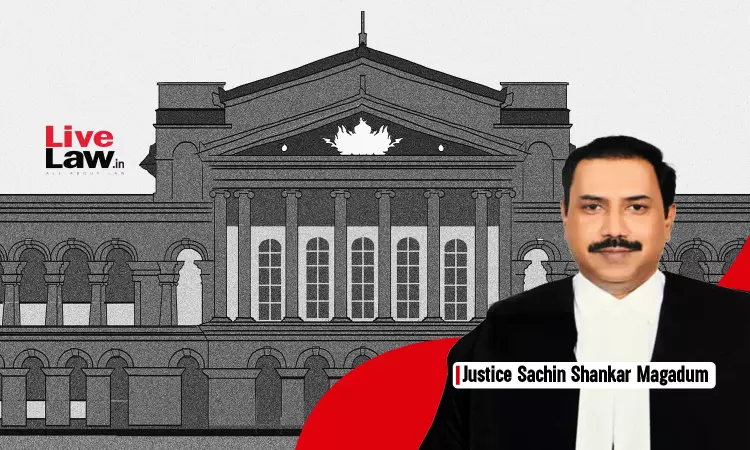- Home
- /
- High Courts
- /
- Karnataka High Court
- /
- 'Cooperative Farming Critical To...
'Cooperative Farming Critical To Indian Agriculture': Karnataka HC Holds GO Refusing Power Subsidy To Farmers' Societies Unconstitutional
Mustafa Plumber
19 May 2025 2:30 PM IST
The Karnataka High Court recently held as unconstitutional a government order dated September 4, 2008, which denied the benefit of power tariff subsidy to farmers' societies purely on the ground of their collective consumption exceeding the specified power limit.Justice Sachin Shankar Magadum holding thus directed the State Government and the concerned electricity distribution...
The Karnataka High Court recently held as unconstitutional a government order dated September 4, 2008, which denied the benefit of power tariff subsidy to farmers' societies purely on the ground of their collective consumption exceeding the specified power limit.
Justice Sachin Shankar Magadum holding thus directed the State Government and the concerned electricity distribution companies (including HESCOM) to review, reconsider, and amend the existing policy framework governing agricultural power subsidies, ensuring that farmer societies are treated at par with individual farmers.
“Consequently, it is declared that the impugned Government Order No. EN 55 PSR 2008 dated 4th September 2008 is unconstitutional, in so far as it denies the benefit of power tariff subsidy to farmer societies purely on the ground of collective consumption exceeding the specified horsepower limit...The authorities must frame and notify appropriate guidelines within a reasonable period (preferably within six months) to extend power tariff subsidies to registered farmer societies, in a manner that aligns with the principles of equality, promotes cooperative farming, and advances the broader goals of sustainable agricultural development,” it said.
The petitioner Shrishail Irappa Kempwad and another who are secretaries of the respective Cooperative Societies had moved the court. It was their contention that they have constructed the lift irrigation project (scheme) on river Krishna for the benefit of 200 acres of land and 103 acres of land in Parthanahalli and Madhabhavi villages of Athani Taluk at approximate cost of Rs.5,79,65,417.
Futher, it was the constitutional responsibility of the state government to provide water to farmers, inaction of the State has compelled the farmers to make their own arrangements for their respective lands by securing lift irrigation schemes by becoming members of the society. These marginal farmers who have formed a society are penalized and discriminated against. The denial of agricultural power tariff subsidy to the societies, amounts to violation of Article 14 of the Constitution of India.
The HESCOM opposed the plea contending that both the societies have entered into an agreement with the HESCOM and they have agreed to the tariffs in terms of the agreement. Therefore, government order is not applicable to the petitioners-societies. Since the order pertains to marginal farmers who are using 10 HP meters or below 10 HP.
Moreover, the petitioner-societies are availing HT power supply and accordingly have entered into an agreement in 2016. Therefore, both societies are liable to pay tariffs charges in terms of the agreement entered into with the HESCOM.
The state government submitted that farmers who are members of these societies can very well avail the scheme in their individual capacity and there is no bar. If they have voluntarily chosen to form a society, then the subsidy scheme which is only extended to the individual farmers cannot be availed by the farmers collectively.
Findings:
The bench noted that the object of the subsidy is to assist marginal farmers by reducing the cost of irrigation and supporting agricultural productivity. The current classification between individual farmers and farmer societies is arbitrary and lacks a rational nexus with the objective of the subsidy.
It said “The denial of power subsidy to registered farmer societies, solely on the ground that their collective consumption exceeds a prescribed limit, is hereby declared unconstitutional and arbitrary. This practice is discriminatory and fails to align with the core objectives of agricultural subsidies, which are intended to support small and marginal farmers, promote equitable access to resources, and encourage sustainable farming practices.”
Further it held that “Differentiating between individual farmers and societies, based purely on collective consumption, is found to be inconsistent with the constitutional mandate of equality before the law under Article 14 of the Constitution of India. It is based on an irrational classification that arbitrarily penalizes farmers for forming societies aimed at improving efficiency and sustainability.”
Referring to various government schemes which have supported cooperative and collective farming practices the court said,
“By denying subsidies to societies that form for collective action, the government contradicts its own policy objectives and fails to support sustainable agricultural practices. Penalizing farmers who organize into collectives discourages cooperative farming, which is a critical aspect of ensuring long-term sustainability in Indian agriculture.”
Noting that subsisdies were extended to unmetered installations, it said, “The current practice of allowing subsidies for unmetered installations based on estimated consumption, while denying subsidies to farmer societies despite their per capita consumption being within the eligibility limits, constitutes a clear violation of both statutory and constitutional mandates.”
It observed, “This action is not only legally flawed but also defeats the very purpose of agricultural subsidies, discourages cooperative farming, and promotes inefficiency and wastefulness in electricity consumption.”
The court while partly allowing the plea directed the farmers societies to clear the arrears in payments and reserved liberty to submit detailed representations seeking benefit of power tariff subsidy under the revised framework. It rejected the prayers made by the petitioner in regard to setting aside the demand notice made by HESCOM and declaration of the specified period as Force Majeure--Covid-19.
Case Title: Shrishail Irappa Kempwad & ANR And State of Karnataka & Others
Appearance: Advocate Shridhar Prabhu for Petitioners.
AGA Ashok T Kattimani for R1.
Advocate B.S Kamate for R2.
Advocate Shivaraj P Mudhol FOR R3 AND R4.
Citation No: 2025 LiveLaw (Kar) 180
Case No: WRIT PETITION NO. 103671 OF 2021



